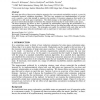Free Online Productivity Tools
i2Speak
i2Symbol
i2OCR
iTex2Img
iWeb2Print
iWeb2Shot
i2Type
iPdf2Split
iPdf2Merge
i2Bopomofo
i2Arabic
i2Style
i2Image
i2PDF
iLatex2Rtf
Sci2ools
PSTV
1992
1992
Coverage Preserving Reduction Strategies for Reachability Analysis
We study the effect of three new reduction strategies for conventional reachability analysis, as used in automated protocol validation algorithms. The first two strategies are implementations of partial order semantics rules that attempt to minimize the number of execution sequences that need to be explored for a full state space exploration. The third strategy is the implementation of a state compression scheme that attempts to minimize the amount of memory that is used to built a state space. The three strategies are shown to have a potential for substantially improving the performance of a conventional search. The paper discusses the optimal choices for reducing either run time or memory requirements by four to six times. The strategies can readily be combined with each other and with alternative state space reduction techniques such as supertrace or state space caching methods.
| Added | 07 Nov 2010 |
| Updated | 07 Nov 2010 |
| Type | Conference |
| Year | 1992 |
| Where | PSTV |
| Authors | Gerard J. Holzmann, Patrice Godefroid, Didier Pirottin |
Comments (0)

